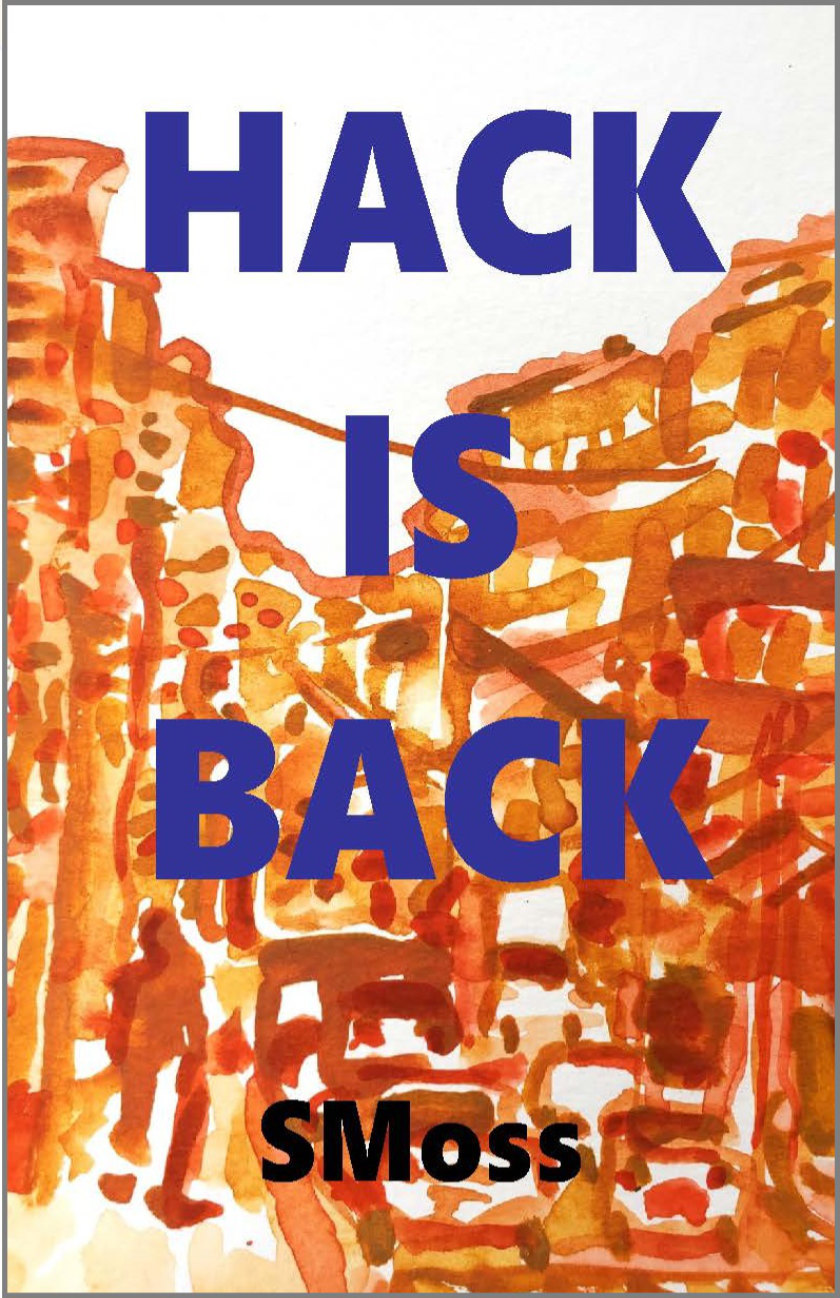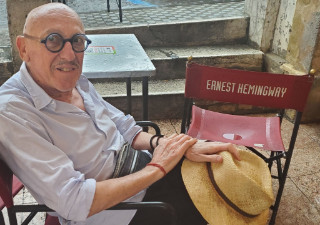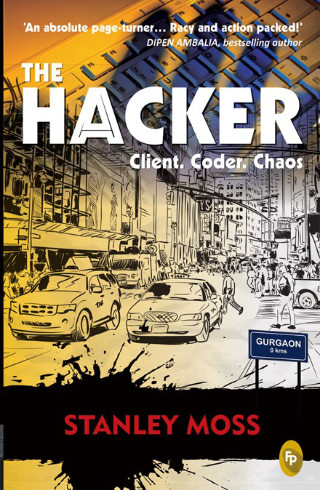
 LIVING After a successful serialization of travel editor Stanley Moss’s novel, The Hacker, earlier this year during lockdown in many countries, we follow up with its sequel, Hack Is Back, which picks up immediately after the conclusion of the earlier story about a young technology company located in Gurgaon, and continues to follow the lives and adventures of all the cast members. This time they’re mixed up with Israeli cybercriminals, Bitcoin ransoms and malware on smartphones
LIVING After a successful serialization of travel editor Stanley Moss’s novel, The Hacker, earlier this year during lockdown in many countries, we follow up with its sequel, Hack Is Back, which picks up immediately after the conclusion of the earlier story about a young technology company located in Gurgaon, and continues to follow the lives and adventures of all the cast members. This time they’re mixed up with Israeli cybercriminals, Bitcoin ransoms and malware on smartphones
Stanley Moss is travel editor of Lucire.
Who’s who
Talsera Gurgaon
Ricky Talsera: company founder (with three partners) and figurehead
Shoba: Ricky’s wife, who keeps the home fires burning, but is nobody’s fool
Rajan Abraham: another founder, software whiz, dedicated family man, idol to all nerds
Sheelu: Rajan’s wife, known for her love of jewels and her legendary butter chicken recipe
Danny Khaneja: third founder, business whiz, operates behind the scenes, super-connected
Jaitendra: fourth founder, ex-military hero, code-writer, silent force behind Talsera security
Neha: Jaitendra’s wife, fiercely independent, self-made, the only equal to her spouse
Hari Bhayya: Talsera’s major domo, security chief and expert on mobile telephony
Priyanka: Talsera’s ambitious head of human resources, brilliant manager
Driver Suresh: served with Jaitendra during the Kargil incident, master of stealth
Various security guards: Talsera’s eyes and ears
Young lovers
Adita: brilliant researcher, traditional daughter, dynamic young Indian woman
Ravi: Adita’s original fiancée, a case of conflicted emotions
Nitin: hypertalented software expert, skilled at cracking code
The Israelis
Shlomo: founder of UltraTel, ex-IDF commando
Yossi: UltraTel’s enforcer
Riva: IDF major assigned to UltraTel on mysterious errands
Other players
Vikram, a.k.a. Shaitan Vikram: brilliant geek who almost brought down Talsera a year ago
Shivani: now-retired Talsera employee nicknamed the Destroyer for her abuse of staff
Jan de Vries: Meteoric Dutch multimillionaire
Bansal the moneylender: operating in Adita’s home village
Raj Kumarji: Adita’s overly conservative father and only trouble
Pooja madam: gossipy woman from Adita’s home village
Col J. G. Singh: Indian military officer of dubious loyalties
Ajit Hooda: underworld boss who knows more than he lets on
The Skull: shady East European billionaire with nefarious interests
Mr Hu and Mr Chu: Guangzhou-based internet consultants
Chapter 1
One year ago, Dwarka Blocks, Delhi
The man tugged on his shoulder insistently, gripping Vikram and shaking him. ‘Get up, kid,’ he said. ‘Get out from under these bodies and let’s get the hell out of here.’
The floor under him felt sticky and wet. It smelled funny, and Vikram thought, so this is what blood smells like. Blood and sweat and shit and the perfume of gunpowder. Now the man was pushing away fallen bodies which held Vikram down, Vikram could see his expensive shoes and cuffs of his khaki trousers in front of his nose.
‘If you don’t get up I can’t help you, and you’re gonna be in a bunch more trouble. You ever see this many dead people in one room?’
‘Who are you?’ Vikram asked.
‘Can we please deal with that later?’ the man said. ‘I mean, I’ve got to get you out of this place before Hooda’s people arrive. That make any sense to you?’
Vikram pushed away the corpse which lay across his back, sat up, looked around the room, dazed. Goodness me, he thought. All those bullets did a lot of damage. The walls were torn up, his favourite poster of Lara Croft had shredded on the wall, and shiny red pools covered the floor. A lot of bodies lay sprawled around, some in military uniforms, some black guys in shiny suits, never going to get up again. Didn’t look like any of the hardware could be salvaged.
‘Come on, kid, get up,’ the man said. ‘No use hanging around here.’ He was an olive-skinned man, jet black hair fashionably slicked back, obviously in good physical condition, sharply handsome like a Bollywood hero, business blazer, dark turtleneck, Ray-Bans. He dragged Vikram out the door, over to the staircase, hustled him down to the parking, where a black SUV waited. He shoved Vikram into the vehicle, slammed the door, and as Vikram tried to wipe the gunk off his blood-spattered hands the SUV sped off into the Delhi twilight.
Gurgaon, present day
‘Bank statements did not lie,’ Ricky Talsera thought, seated at his desk, still somewhat dazed at his super-sized balance. An unthinkable avalanche of money recently descended on him, and presented conundrums never before considered. Sudden wealth had come to Talsera’s partners rapidly from an unexpected quarter, followed by radical changes in—everything. Ricky’s transformations included plans to build a new house on a large plot of disused farmland his family owned ten miles out of town. A better car and raises for his faithful driver and amah. New central air conditioning for his parents’ home. One of Talsera’s four partners, Danny Khaneja, who had worked so hard to keep the company in business, elected to spend more time with his children, use his new wealth to live in Europe half the time. Ricky’s third partner Rajan Abraham upheld his low profile after receiving his payout—already a contented family man, he continued to shower his wife and daughters with ever greater indulgences and affection. Jaitendra, the final partner and an ex-military man who possessed expert skills beyond code-writing, had married his girlfriend in an ultra-extravagant wedding attended by every single one of Talsera’s employees; he and his bride Neha embarked on a six-month trip around the world, from which they had only just returned.
The year before, Ricky was but a founder and managing partner of a small Indian technology company which bore his name. It had grown in size and reputation in its short life. Then bad things happened after a brilliant but disgruntled employee named Vikram was dismissed, mostly for antisocial behaviour. Unknown to Ricky and his team, Vikram had departed with stolen passwords and inserted himself secretly into Talsera’s intranet, monitoring the confidential inner functioning of the company, party to all its secrets and vulnerabilities, some which he had created. Vikram had been bent on destroying the company, despite the fact that it had nurtured him. He held particular animus for his supervisor, an abusive Talsera executive named Shivani. She was a venomous dragon lady with seniority, since she had been one of the earliest employees to the company. Vikram nearly succeeded in bringing the company down through a series of anonymous blog posts and a failed attempt to compete with Talsera. He had blatantly approached one of its largest customers, a Dutch company named RoodInfo, headed by a near-psychopath CEO named Jan de Vries. It had taken all the energies of Talsera’s management to expose the duplicity and protect their reputation. To the best of their knowledge, with Jaitendra’s help Vikram had been exiled to South America, and nothing had been heard from him since. RoodInfo remained as a profitable client.
Then, six months ago, Ricky visited Europe, a routine business trip. He had been surprised when the volatile de Vries invited him to lunch. Over oysters, followed by a perfect salmon mousse, medallions of veal with a potato tartelette, washed down with a superb ’71 Crozes Hermitage, accompanied by an unusual amount of small talk, it became evident that de Vries had a scheme in mind.
‘Since our little episode,’ the Dutchman finally said, ‘your guys have been of tremendous help to us. Bigger success than I could have predicted, OK, I was wrong. You guys are great. So good I’m worried that other people might discover you and take you away from us, legitimately this time.’ Ricky sat up straighter in his comfortable chair. De Vries stopped, ordered two cognacs without asking Ricky, resumed his train of thought. ‘So I am going to ask you this just one time, and you can do what you like with it. I want you to think up a number, the amount you’d like for us to buy your company lock-stock-and-barrel, turn you into a division of RoodInfo. Only one time I’m saying this, you think about it, you answer what you like. You say nothing more, the offer’s off the table. It is what it is. We’re back to where we were. But think about it, Ricky. Put our companies together, we have a lot of connections, you could make a shitload of money, more than you can imagine. That’s my pitch. You want to, you get back to me with a number and we’ll hand it over to the lawyers, see what they can do with it.’
Chapter 2
‘Our friends at the National Data Center in Roanoke have looked over everything and they tell me it’s not familiar to them. They’ve never seen anything like it before,’ Nitin reported, standing uncertainly before Rajan Abraham’s desk, eyes downcast, hands clasped behind his back, wobbling nervously. ‘I tried Roanoke after the bad guys sent me some code nobody else could possibly have had, and they threatened if we didn’t pay them a million in Bitcoin by Monday morning they’re going to shut us down.’
‘Interesting,’ Abraham said. Few things he loved more than his wife and daughters and a good software problem. ‘You have a plan in mind?’
‘Sir, I stayed up all night studying their message. I think we need to remind everybody company-wide not to click through on anything even mildly suspicious. I think we need to encrypt everything from now on, no matter how innocent or trusted it is.’
‘That would be a loud panic alarm, Nitin,’ Abraham answered. ‘Think about what people would say if we did it. Let’s engage in some diplomacy first, try and put off the bad guys, tell them we don’t usually deal in Bitcoin, tell them it’s a big number and we need some time to set things up.’ I’ll get Khaneja on this, Rajan thought, but didn’t say so. He’ll have some ideas on what we can do.
‘I’m not sure, sir. They seem pretty knowledgeable about us,’ Nitin went on awkwardly. ‘They seemed pretty comfortable with how this works. One of my thoughts was to close down everything for a day over the weekend. Do a total reboot, run some smart diagnostics.’
‘You know that’s impossible. With our clients all over the world, things would grind to a halt. Airplanes couldn’t take off or arrive, parcels couldn’t ship or be tracked, climate measuring networks would suddenly stop functioning. And don’t even think about the alarm systems. Nope, we don’t interrupt service. We’ve got to nail these guys before they nail us.’
‘I should put my whole team on it, then? All 125 of them?’
‘No, don’t do that yet. If word gets out we’ll have trouble on all sides. We need to keep this contained. Why don’t you take the rest of the day off, get out of the office, think about it off-site, see if some inspiration comes to you.’
‘Inspiration, sir? How does one get inspiration?’
‘That, Nitin, is the question for the day.’
It was the dowry, she thought, even though to her fiancée that aspect was completely unimportant. Her father, Raj Kumarji, had insisted that everything be done correctly. She knew he wanted to pay for it all on his own, that he would accept nothing from anyone else. At the families’ first meeting it could have gone better. Ravi and his parents were modern and progressive people, who had no problem with a marriage based on love. They were encouraging, appreciative of everything and everyone, never judgemental or condescending. Rather, they happily suggested, it would be their complete joy and honour to contribute to the costs of the wedding. Ravi’s mother was brilliant and charming, never overbearing. Her sari was the correct one, well chosen, not too prosperous, not too plain. She complimented him on what a beautiful and talented daughter he had raised. But Adita’s father would not hear it so easily. His damned pride, she thought. Ravi should be glad to find a girl like Adita, he said. They were rarer and rarer, like precious jewels.
The formal meetings and the understandings proceeded. They now knew it would be held in her home village, a tiny and provincial place stuck in the middle of nowhere, difficult for his Delhi family to reach. At best, the nearest modern hotel was over 20 km away. A place she would be so pleased to visit, said Ravi’s mother delightedly. We don’t get to the country enough. Raj Kumarji had chosen a pandit. Adita now had an idea of how many guests to expect, and when her father heard the number he turned pale; the cost of feeding them alone! The rental of the hall, the required number of saris. She could see that Raj Kumarji struggled with those items. And they had not yet discussed the gifts to be given. Now they awaited the village astronomer for a lucky date. But she knew that her father fretted over the dowry amount. Too little and he would appear to be of a lower class than Ravi’s parents. It did not matter that she had been sending her father money for all the time at Talsera, or that she and Ravi had made small fortunes for themselves playing the Indian stock market. The truth was, she could have paid Ravi’s family a respectable dowry amount herself without her father’s help, and still had enough left in savings. This she could not tell her father, knowing full well he would hear none of it.
Ravi had never shed his encouraging and cheerful presence in her life. Now that their engagement was public knowledge they could hold hands in public at Talsera, sit together without starting up vicious rumours. But she could tell he was getting anxious, and he had become more insistent. They still exchanged private texts and small greetings during the workday, he was still the sweetest and handsomest boy she had ever met. But the pre-wedding stress was getting to him, just like the article she had read last month in India Girl magazine predicted, ‘When Your Husband-To-Be Has A Meltdown’.
If you had a new phone and it wouldn’t take the fresh SIM card, Hari Bhayya knew what to do. Leave it with him in the morning, the phone would be unlocked and working by noon, twenty rupees. If you dropped your phone and cracked your screen, Hari Bhayya could somehow find a replacement, old one went out, new one went in, done in a day. Sometimes you’d catch sight of a cyclist dropping a bag off to him at one of the security boxes by the entrance, parts no doubt. Hari was faster, better and cheaper than the guys down at Nehru Place, and you didn’t have to leave the office. With Khaneja’s permission he had built a small wood desk with a lamp in his sleeping cubicle off the fifth-floor staircase of Einstein Building 3, where he laid out a small line of precise tools and a stack of brown envelopes. At his right sat a multi-pronged charger station, always full of devices. Whenever a new Iphone was released, a battered cardboard box at the edge of his desk appeared, where many more envelopes stood upright, name, date and problem notated in the top right corner in his spindly hand.
Very strange day, thought Hari Bhayya, looking at the three identical Xiaomi Model MDX3s which had come in this morning. The same phone, same make and model, the same complaints, different people from different work groups, something about games not functioning, difficulty in sending and receiving messages. The apps, Hari Bhayya thought immediately. These kids never want to program their own phones. The answer’s all going to be in the apps.
Chapter 3
One year ago, continued
‘Keep your head down, kid, and stop fidgeting,’ said the handsome man who had rescued him. ‘You’re not gonna get any of that blood off for a while. Might as well let it be. It’s gonna be another hour or two in the car. Then you can clean up.’
Vikram couldn’t see far, but he knew they weren’t going in the direction of the airport, wrong way. What a crazy day, he’d already been to IGI once in the morning with Jaitendra, but he’d escaped and stolen back to his secret workplace, where he’d discovered a bunch of thugs waiting around, and then some police with machine pistols broke in and shot up the whole flat. Then this guy pulls him out of the scene of the disaster.
Now the SUV was racing along back roads, making a lot of turns, going over bumps, slowing down for corners, and they definitely weren’t in the big city any longer. ‘Who are you guys? Where are sirs taking me? I am innocent. I did nothing wrong I am telling you. What do you want from me?’
‘You ask a lot of questions for a person who just got rescued from some serious shit,’ the man said. ‘I’d advise you to keep your big mouth closed and wait to see what happens. You’re going somewhere you’re gonna fit in real well. New friends, remind you of home. Sun, beaches, nightclubs, hot babes. Change is good, didn’t anybody ever tell you that?’
‘Nobody has told me anything, sir,’ Vikram insisted. ‘I would only like to know where we are going. With all due respect, I will soon need the use of a loo.’ Keep them talking, he thought.
The driver turned his head back to the rear seat. Flashed a grin at them, looked like a Paki, dark skin, thick black hair, fat ’stache, shiny white teeth. ‘Mister Vi-kram,’ he said, pronouncing the name vy-kramm, ‘better learn to hold it in.’
‘It’s vee-kromm with the accent on the last syllable, Sir.’
‘Yeah, whatever,’ the driver said. His attention returned to the dark road, blackness broken by an occasional headlight quickly illuminating the van, then disappearing.
‘Shut up, kid. Keep your comments to yourself.’
‘Sir, I must know what are your good intentions.’
The man leaned over and grabbed Vikram by the front of his shirt, dragged him inches from his handsome face, noses almost touching. Vikram could see his own wide-eyed reflection in the lenses of the guy’s mirrored shades, automatically grabbed for the man’s wrist and the man slapped him hard on the side of his head. Vikram recoiled and cowered on the seat, his ear stinging where the blow had landed. ‘You want to know my good intention? That was my good intention. You keep up the funny with me, smart guy, keep up the attitude,’ the handsome man said, ‘that’s what you get. Now you sit back and shut up. Be a smart fellow, here, take my handkerchief, don’t cry, not gonna help. You behave, I won’t hurt you again.’
Present day, outside Gurgaon
Kids finally asleep in the car seats behind him, Danny Khaneja hoped to turn his mind to the latest news from Talsera, the company he had helped start and where he still worked behind-the-scenes to keep the wheels turning. The kids had been up earlier than usual, 6 a.m., and he had promised them a bike ride that morning out in the open spaces where they did not have to be constantly vigilant about cars, buses, auto-rickshaws, trucks or two-wheelers barrelling by and blowing their horns, kicking up dust and gravel, spewing exhaust. Today looked navigable, wind predicted for the afternoon. This meant the usual logistics in mobilizing Mom, getting out of the house and down to the subterranean garage, the loading of bikes, survival packs, snacks, bottled water, an emergency change of clothes for both, the drive out to the country, then repeating the process in reverse order. Khaneja had lately been engaged in a major program to get people at Talsera biking to work—the company was interested in doing their part to help reduce Delhi’s unthinkable pollution. Some days it just wasn’t possible to allow children outside—Delhi’s particulate numbers were too high. Danny had used his substantial network of official connections to foster the creation of bike lanes, no-traffic Raahgiri days, group rides, special incentives to encourage the programme. He’d spoken to politicos he knew, rallied his fellow tech executives. Khaneja believed his family’s health and the country’s future were intertwined causes. The kids knew about his commitment, and they wanted to ride their own bikes now. He had pedalled with them for two hours in the heat that morning, out by an abandoned tea house he knew on a quiet paved rural lane, finally got the bikes back into the car, kids buckled into their seats once more, Mom dozing in the passenger seat, and he could focus on Ricky Talsera’s latest message. Something about extortion.
‘I thought you said this was a good car,’ Neha commented. The sapphire black BMW M6 had come to an unexpected stop on an isolated roadside. It seemed very quiet out there, afternoon sun, fields of yellow mustard blooms stretching off into infinity, nobody around. ‘What’s going on?’
Jaitendra reached across to the glove box, opened it, pulled out a tiny pair of high-powered binoculars, closed the glove box. ‘You all right in the car for a couple minutes, or would you like to get out with me? I mean, I need to look at something.’
‘I’m getting out,’ Neha said, opening the door for herself. ‘What do you think, I’m some innocent little flower who waits in the car while the big powerful man takes control? I remind you our deal is partners all the way.’
‘That’s the deal,’ Jaitendra said, grinning, getting out of his side. She stood there in the breeze, and he admired her grey silky billowing clothes, infinitely glad he had married her. He walked up by the headlamps and raised the bonnet.
‘I thought you said this was a good car.’
‘It is,’ Jaitendra told her. ‘This is a diversion. Supposed to look like the car’s overheating. Then people don’t get suspicious.’
They heard the sound of another car turn on to the highway about a quarter mile ahead of them and Jaitendra stashed the binoculars in his jacket pocket. The car sped in their direction, slowed down next to the Beemer, came to a halt. Late model Tata sedan, dark brown, decent repair. Four men in the vehicle, military age, clean haircuts, nobody getting rowdy, nobody looking drunk. A young man leaned out the passenger side.
‘Trouble?’ asked the young man.
‘Nope,’ Jaitendra said. ‘Just letting the engine cool off, been running kind of hot, taking a break. Thanks for stopping.’
‘Accha,’ the young man said. ‘That’s a pretty nice new car you have. Fast, right?’
‘It’s okay,’ Jaitendra said. ‘We just got it. First day outside the city. Trying it on the open road.’
‘You from Delhi, naaa? Long way away from the city limits.’
‘I guess I got distracted, we came out this far,’ Jaitendra said. ‘Enjoying the scenery. My wife and I were having a deep discussion the last twenty miles or so. The red light on the dash went on. I think it’s going to be fine.’
‘Going to be fine,’ Neha said, flashing her warmest smile.
The man in the Tata looked at his companions, his watch, Jaitendra’s BMW. ‘You out here searching for anything in particular? Need directions? Know your way back? You do, OK. Yeah, well, you take care, sir. Get home safely.’ He nodded at the three others in his car. They made a U-turn, drove the quarter mile back to the road where they’d come from, disappeared off into the landscape.
‘Good cars don’t overheat, especially new ones.’ Neha said. ‘You’re not fooling anybody, especially those bad guys.’
‘I didn’t say I was fooling bad guys.’
Neha laughed at him. ‘Then who else gets suspicious?’
‘Ah, an existential question,’ Jaitendra said, binoculars back in hand, scanning the far horizon. Nothing there, no movement among the trees, no sign of dust clouds, no reflections off lenses hidden in the fields. He pointed. ‘A private airstrip’s on the other side of those hills. I heard there was unusual activity late last night, thought I’d take a look around for myself.’
‘I believe you said to me, ‘Let’s take a little drive out in the country today, get some fresh air.’ Not that you wanted to check for criminal activity.’
‘Some disclosures are given only on a need-to-know-basis,’ he told her. ‘Didn’t want to alarm you. Talk of small planes flying low under the radar, drug dealers, secret military flights, smuggling antiquities, maybe other stuff. Might frighten you. My dear friends at the Cantonment tipped me off, said I might be interested.’
‘Are you?’
‘Not yet,’ Jaitendra said. ‘But I have an intuition.’
‘Uh-oh,’ Neha said. ‘I do not like the sound of that. Now I am alarmed.’
Related articles hand-picked by our editors
 The Hacker
The Hacker
For those facing an extended lockdown during the pandemic, have we a tale for you, serialized over the upcoming weeks. In the novel The Hacker, by travel editor Stanley Moss, all hell breaks loose at a struggling young Gurgaon-based software firm when Shaitan Vikram, one of its ex-employees and a psychopath hacker, swears to revenge his legitimate but ill-timed dismissal from the company rolls
Prologue |
Chapters 1–4 | 5–8 | 9–12 | 13–16 | 17–20 | 21–2

Chain reaction
Through the course of a year, Stanley Moss came across Accor’s Pullman chain five times in three countries. He discovers that in each city—New Delhi, Marseille, Auckland and Paris—Pullman was united by high standards
Photographed by Paula Sweet

Green India.
Stanley Moss discovers that ecotourism need not be the ego-driven affair that it has become in some circles. Keeping it pure, he visits Chhatra Sagar, Sarai at Toria and Samode Safari Village in India
Photographed by Paula Sweet
From issue 35 of Lucire
Advertisement
Copyright ©1997–2022 by JY&A Media, part of Jack Yan & Associates. All rights reserved. JY&A terms and conditions and privacy policy apply to viewing this site. All prices in US dollars except where indicated. Contact us here.